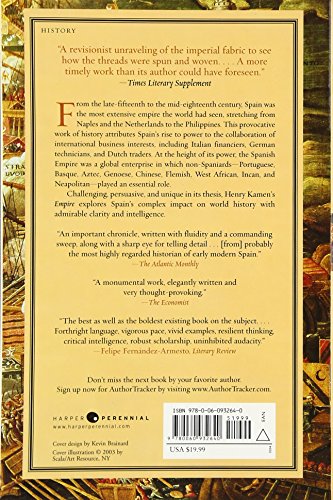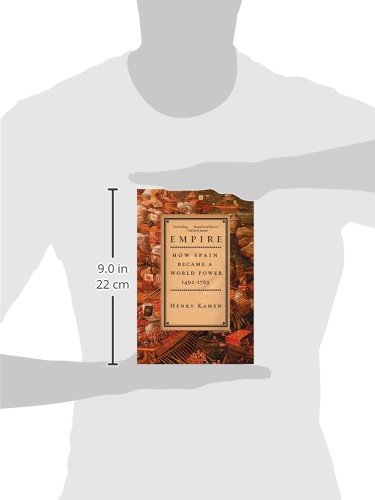



Empire: How Spain Became a World Power, 1492-1763
J**.
So so
Starts off very good. Especially discussing the Moors, which few books talk about for whatever reason 🙄 but then it begins to get very so so. I’m about half way done. Good book for truth seekers on Moorish (Black/African American/Moorish American) history.
M**O
Everything you were taught earlier about the Spanish Empire was propaganda.
This is a great historian who carefully documents his hypotheses.
S**T
A simplistic book full of prejudices
This book has been a disappointment to me. I expected a well balanced revisionist work. What I found is an attempt to re-write history for political motivations.The author lives in Barcelona, has adhered to the thesis of Catalonian independentism, and clearly repeats like a parrot a number of unfounded 'Catalanist myths':1) The Spanish Empire was not built by Spaniards.2) However, Spain's rivals don't owe anything but to themselves.As ridiculous as it sounds, the author repeats these two lines once and again, until they become a 600 pages book. The evidence presented is mostly anecdotal.Any smart reader will come with a number of questions after page 2: "But if the Spanish Empire was built by Germans, as the author wants to make us believe, why is German not spoken in America? And why wasn't it called "German Empire" in the first place?". The reader won't find the answer to these questions in this book ... because the questions presented in this book make no sense in the first place.
B**S
Five Stars
good read good price
R**4
Worth the read.
Great story.Lots of interesting surprises.Incredibly well researched and well written. Outstanding scholarship.
G**A
Historical revisionist non-sequiter
This is not Henry Kamen's book. Mr. Kamen did not finance the publishing of this book or it's marketing (this was performed by Harper Collins Publishers). He did not design the cover jacket or perform the actual printing, paper cutting or binding. Furthermore, Mr. Kamen did not create the computers and/or typewriters he used in 'writing' the 'manuscript'. In addition, he did not write any of the other books mentioned in the Bibliography and Notes. He did not locate, collect and catalog the source materials. And, of course, he had nothing to do with the actual events recorded in the 'book'. Therefore, to speak of this book as "Henry Kamen's" book is an act of arrogant and ignorant pride.Now, if you can see through the inanity of the above, then you'll be able to grasp the failure of Henry Kamen's central thesis in "Empire." He tries to make the case that the Spanish Empire was neither Spanish nor an Empire (along the lines of Voltaire's quip about the Holy Roman Empire). The main premise in his argument is that since the Spanish Empire was not created entirely by Spaniards using only Spanish money and all Spanish technology (etc., etc.), that therefore it is more properly to be called a corporate empire, an international one, or whatever.The short demolition of this thesis lies in my 1st paragraph. Mr. Kamen can claim this book as his own because he had the Vision for it and because it would not have existed without his effort. It may be that all the materials capable of producing the book "Empire" already existed and Mr. Kamen had nothing to do with them. But it does not follow that "Empire" would have come into being without the active input and motivation of Mr. Kamen. If he (or you) doubts it, just try to take away his royalty checks.Likewise, the Spanish Empire did not come into being simply because Genoese bankers and adventurers had money to lend and time to kill. It did not happen because American Indians fought amongst themselves or because most of Western Europe was eager to see the liberation of the Maghreb. There are reasons why, in the 16th century, the French or Genoese, or German merchants did not create the first world-wide empire on five continents. Unfortunately, you'll not learn about them by reading this book.There are several failures of logic that run throughout Mr. Kamen's argument. First is his complete failure to grasp the basics of economics. Throughout the book he makes continual snide remarks about how this or that technology or advance in information used by the Spaniards was nothing more than an input from some other country or culture. Now, the last time I checked, nothing in life is free. If the Spaniards were able to buy books from abroad instead of manufacturing them at home, or to use the military technology of rival countries, they were only able to do so because they had something of unique value to give in return. This is the basic economics of trade. So, what was it that the Spaniards had of unique value that helped them to acquire the things they did not have? Again, Mr. Kamen does not say. Perhaps it was the early political stability that Ferdinand helped to create? Mr. Kamen notes this but then does seem to think it amounts to much in the way of explaining Spain's success. Or perhaps it was their location, an attribute of happenstance, maybe, but valuable enough. Or was it the new-found energy, confidence and adventursomeness that characterized Spanish culture in the 16th Century? Mr. Kamen does the Spanish a disservice by papering over these kinds of valuables.Then, of course, there are the hypocritical attacks on Westerners in general. Westerners (e.g. White European Christians) during the Early Modern Period are constantly denigrated for supposedly being oblivious to the cultures of other societies and of always trying to "go-it-alone" because of blind arrogance or racism, or something. But in "Empire", Mr. Kamen reverses the charges. Because the Spanish used their abilities at leading other peoples and their sound (and clever) diplomacy in creating their Empire, Mr. Kamen now says that THIS disqualifies them from any praise as well!! What's a poor Western White Boy to do?!?! When you do your own thing you're accused of obscurantism and arrogance; when you learn about other cultures and use their skills or even integrate with them, then you're just a weak cipher who can't do anything himself. Sheeeesh!!Finally, the most basic failure of Mr. Kamen's thesis is an inability to prove that the Spanish were somehow unique in the way they formed their Empire. After Rome had conquered the Samnites and Etruscans closest to them, you could have easily said that it really wasn't a Roman Empire, but a Samnite and Magna Greacian Empire. Likewise with the Muslim Empire. Most of the warriors making up the Muslim armies in Africa and Persia and elsewhere where slaves of many different races. You could go on and on about any and all such political combinations. It would have been much more fruitful if Mr. Kamen had tried to give a good definition of why we name an Empire after a particular country or culture. Is it because of a common language? The location of the central city? The legal code (a la Napoleon's Empire, and even Rome's to some extant), or what? Unfortunately, Mr. Kamen seems bent on simply denigrating the Spanish to no observable purpose.So the next time you get a bonus at work or a good grade on a test, just pick up Henry Kamen's "Empire" and prove to yourself that you had nothing to do with it after all!P.S - one of my pet peeves is the use of quotations around words to deligitimize a concept by bypassing any argument. Kamen does this repeatedly in the book, placing the word empire in quotation marks whenever it refers to the Spanish Empire. Cheap shot and then some! For a good analysis of this technique by various hacks, see David Stove's essay "Neutralizing Success Words" in his collection "Scientific Irrationalism."
J**N
Five Stars
quick shipper, item as advertised, Thanks!
G**L
Good history with an important Caveat
The caveat is that the Spanish Empire was in many ways not Spain's. Empire reminds us that many of those working, and fighting, for Spain were non-Spaniards. This is repeated throughout the book, for the most part to good effect.Empire is a truly academic work, in the sense that it presents us with the dark side of the Empire, without pretending that Spain of five centuries ago should be judged by modern standards. What Spain did wrong, and there is plenty, is presented as simple fact, and placed in the context of how human beings behaved in that time period.The two minor flaws I see in the book are these: Empire reminds us, rightly, that many who worked for Spain were not Spaniards, however, too much can be made of this. The men involved thought they were working for the Spanish Empire, their successes were attributed to that Empire, and benefitted that Empire. Where Spain's soldiers were born is interesting, but not quite as important as the author believes. Still, he can be forgiven for over-emphasizing in this book something that is ignored in others.The other flaw is a lack of consistency in applying this underlying principal to other countries in their dealings with Spain. When the Spanish Empire faces other powers, whether in the old world or the new, the troops of those powers are typically treated as homogenous masses. Surely, if Spain's men were not all Spanish, and that is important, then the makeup of the forces opposing Spain should also be investigated...Still, the book is the very readable story of one of the greatest empires in european history. It deals with the worst aspects the Empire without either condoning them or descending into moralistic chest-thumping. If you're interested in the subject matter, you'll enjoy this book.
F**K
Great history book on the Spanish Empire
Bought this for a module at uni re the Spanish empire and it was a fabulous buy. Lots of thought provoking stuff, great details and clear explanation. Really enjoyable and easy to read.The best of all the books covering this era,even better than Elliot although the latter is an essential book to but as well.
Trustpilot
1 month ago
1 month ago